“It’s only the tip of the iceberg. A grand geopolitical project is beginning to materialize…”
On June 6 2014, the official Russian news agency Itar Tass announced what many were expecting since at least the beginning of the Ukrainian crisis: Russian main energy company, Gazprom Neft has finally “signed agreements with its consumers” to switch from Dollars to Euros (as transition to the ruble) “for payments under contracts”.
The announcement that the agreement has been actually signed and not just discussed was made by Gazprom’s Chief Executive Officer, Alexander Dyukov.
Despite the pressures from Wall Street and its military, propaganda and political apparatus, 9 out of 10 consumers of Gazprom’s oil and gas agreed to pay in Euros. Of course, the big watershed was the Gazprom unprecedented 30-years $400Bl natural gas supply to China signed in Shanghai last May 21 in the presence of President Putin and President Xi Jinping in the middle of the Anglo-american sponsored violent destabilization of Ukraine. In fact it is improper to talk a dollar denominated $400Bl, because this “biggest deal” will not be using dollars but the Renminbi (or Yuan) and the Russian Ruble. It links China and Russia economically and strategically for three decades, de facto (and maybe later also de jure) creating an unshakable symbiotic alliance that necessarily will involve the military aspect.
The Russia-China agreement is a clear defeat of the obsessive geopolitical attempts by Wall Street to keep the two country in a situation of competition or, ideally, war-like confrontation. It changes the structure of alliances. It strikes at the historical foundations of British colonial geopolitics (Divide and Rule). Under escalating pressures and threats to their national security, Russia and China overcame brilliantly historical, ideological, cultural differences which had previously been been by the colonial powers (and their financial heirs in Wall Street and the London’s city) for their “Divide & Conquer” strategy.
Furthermore, to the horror of London and Washington, China and Russia concluded an agreement with India (the BRICS!) breaking the other holy tenet of British colonial geopolitics: The secret to controlling Asia, and thus Eurasia has always been to instigate a perennial rivalry between India, China, and Russia. This was the formula for the 19th century “Great Game”. This was why Obama was selected to succeed George W Bush. The then vice Presidential candidate Joseph Biden announced it very openly on Aug 27 2008 at the Democratic Convention in Denver, explaining why the Obama-Biden duo had been chosen to take over the White House. The greatest mistake of the Bush administration and the Republicans, he said, was not their atrocious unchained warmongering, but their failure
“to face the biggest forces shaping this century. The emergence of Russia, China and India’s great powers”. Zbigniew Brzezinski’s protégé Barack Obama was to defeat this “threat”. Obviously they failed! But this explains the dogged, irrational, King Canute-style self-destructive arrogance that has taken over the present Administration.
The significance of these developments should be emphasized in relation to both the real economy and the underlying financial structures. These developments in Eurasia are likely to have weaken on “the chains that have tied the European Union to Wall Street and the City of London”. The end of the dollar payment system (Aka Petro-dollar) does not concern the currency of the United States or the United States as such. In fact overcoming this system could mean the restoration of a rational and prosperous economy in the United States itself. What is known as “dollar system” has been just an instrument of feudal financial centers to loot the economy of the world. These centers are ready to do anything to save their right to loot. It is well known that whoever tried, until now, to create an alternative to the dollar system, met a ferocious reaction.
It is fitting to remember in this moment of great hope, the words of one of the very few great living strategists, Gen. Leonid Ivashov. On June 15 2011, reflecting on the savage destruction of Libya, the general who is an unofficial spokesman of the Russian armed forces and has been Russia’s representative in NATO, wrote
“BRICS and the Mission of Reconfiguring the World.”
Whoever challenges the dollar hegemony, explained Ivashov, becomes a target.
He gave precise examples: Iraq, Libya, Iran:
“the countries which defied dollar dominance invariably came under heavy pressure and in a number of cases – under devastating attacks.” But the “the financial empires built by Rothschilds and Rockefellers are powerless against the five largest civilizations represented by the BRICS.”
Thus, Ivashov advocated a coordinated strategy by countries representing half of the world population to win their independence using their own currency.
“The shift to national currencies in the financial transactions between the BRICS countries should guarantee an unprecedented level of their independence…”
Since the collapse of the USSR, the countries which defied dollar dominance invariably came under heavy pressure and in a number of cases – under devastating attacks. Saddam Hussein –who banned dollar circulation in all spheres of Iraq’s economy including oil trade– was displaced and executed and his country was left in ruins. M. Gaddafi started switching Libya’s oil and gas business to gold-backed Arab currencies and air raids against the country followed almost immediately… Tehran had to put its plan to stay dollar-free on hold to avoid falling victim to aggression.
Still, even enjoying unlimited US support, the financial empires built by the Rothschilds and Rockefellers are powerless against the five largest civilizations represented by countries accounting for nearly half of the world’s population. BRICS is clearly immune to forceful pressure, its member countries do not appear vulnerable to color revolutions, and the strategy of provoking and exporting financial crises may easily backfire.
In contrast to the US and the EU, BRICS countries altogether own natural resources sufficient not only to keep their economies afloat in the settings of contracting availability of hydrocarbon fuels, food, potable water, and electric power but also to sustain vigorous economic growth. The shift to national currencies in the financial transactions between the BRICS countries should guarantee an unprecedented level of their independence from the US and from the West in general, but even that is only the tip of the iceberg. A grand geopolitical project is beginning to materialize
Now it’s the moment for Europe to decide the big step. The Ukrainian crisis is in reality a Battle for Europe.
The elites of Continental Europe — The Germany of Alfred Herrausen, the France of Charles De Gaulle, the Italy of Enrico Mattei and Aldo Moro, the Europe that tried to road of sovereignty and independence … have been until now terrorized and threatened exactly in the terms explained by Gen Ivashov. Now the Battle for Europe is raging. We will look in a coming article at the great European forces, the silent partners, still traumatized and scared, who are looking with trepidation and painful memories of the past defeats at the firm stand of Russia.





 del.icio.us
del.icio.us
 Digg
Digg
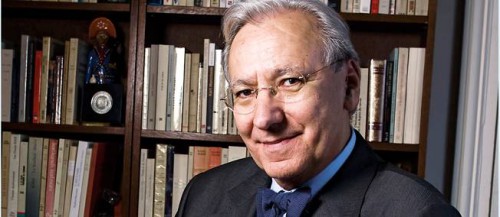
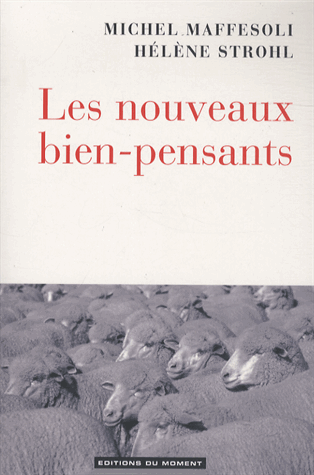 Vous pouvez découvrir ci-dessous un entretien avec le sociologue Michel Maffesoli, cueilli sur le site du
Vous pouvez découvrir ci-dessous un entretien avec le sociologue Michel Maffesoli, cueilli sur le site du 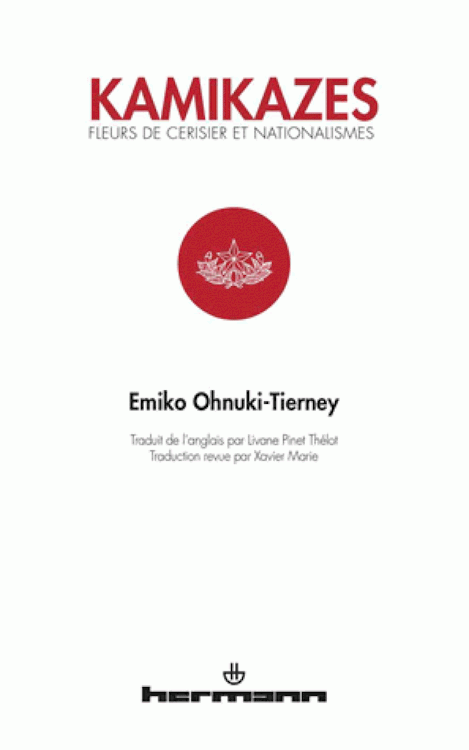
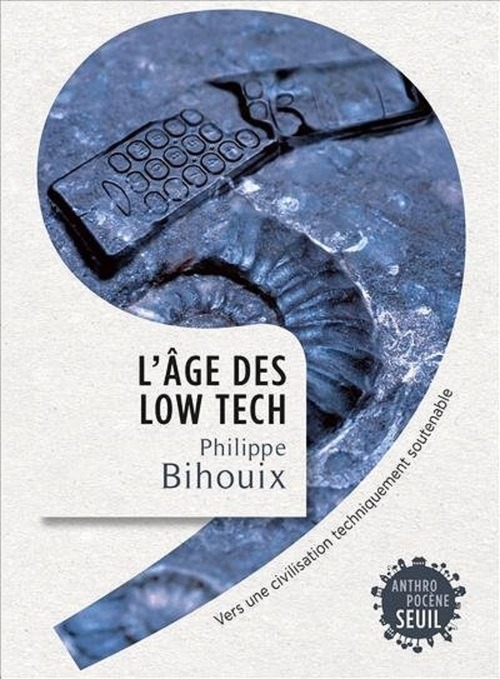
 Relations between Iran and China are as old as history. The two countries, as cradles of the world’s most ancient human civilizations, have been interacting in various fields for thousands of years. During this long period of time, cooperation has been the dominant model governing the relations between Iran and China. The Silk Road stands as the symbol of cooperation and interaction between the two countries during past centuries. Under present circumstances and in continuation of the aforesaid historical model, relations between the two countries are based on cooperation in various political, security, economic and cultural fields.
Relations between Iran and China are as old as history. The two countries, as cradles of the world’s most ancient human civilizations, have been interacting in various fields for thousands of years. During this long period of time, cooperation has been the dominant model governing the relations between Iran and China. The Silk Road stands as the symbol of cooperation and interaction between the two countries during past centuries. Under present circumstances and in continuation of the aforesaid historical model, relations between the two countries are based on cooperation in various political, security, economic and cultural fields. However, in spite of the fact that there are great capacities for the expansion of cooperation between Iran and China, sensitivities caused by the third parties have created serious obstacles in the way of development of bilateral ties. The United States and Israel have played a totally destructive role in their effort to undermine relations between Iran and China. Sanctions imposed on the Islamic Republic by the United States have greatly slowed down long-term cooperation between Iran and China in the field of energy. They have also worked to reduce the pace of foreign investment in Iran and have caused many problems for all kinds of bank transactions between Iran and China.
However, in spite of the fact that there are great capacities for the expansion of cooperation between Iran and China, sensitivities caused by the third parties have created serious obstacles in the way of development of bilateral ties. The United States and Israel have played a totally destructive role in their effort to undermine relations between Iran and China. Sanctions imposed on the Islamic Republic by the United States have greatly slowed down long-term cooperation between Iran and China in the field of energy. They have also worked to reduce the pace of foreign investment in Iran and have caused many problems for all kinds of bank transactions between Iran and China.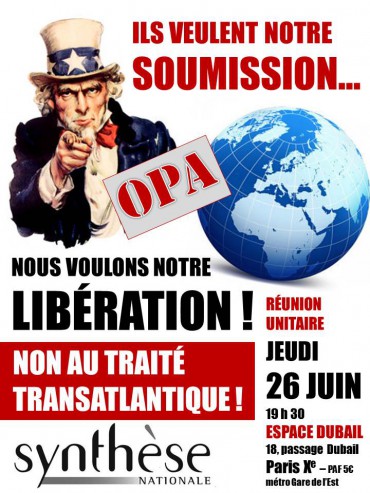

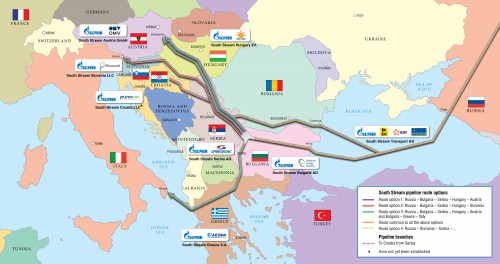
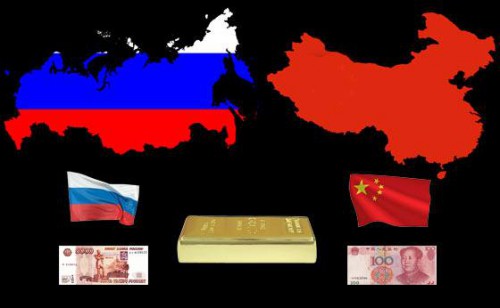
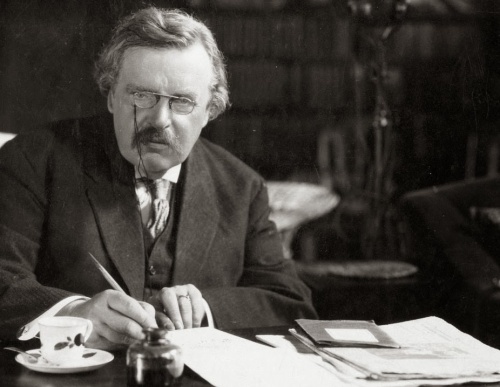
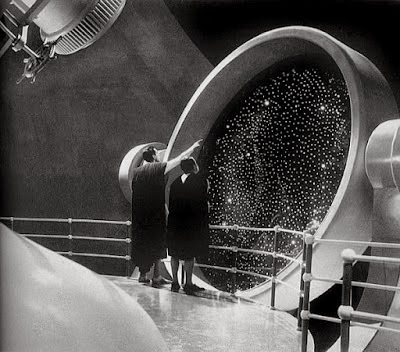

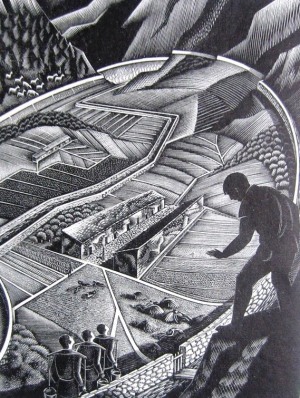

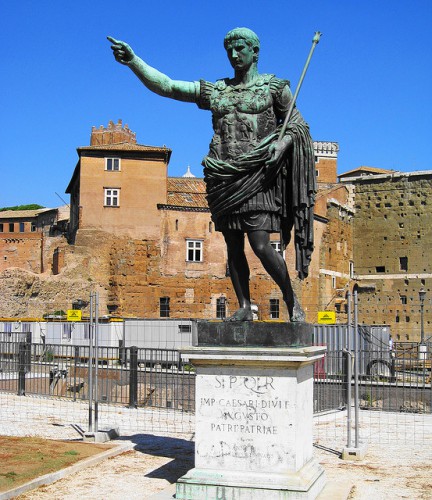
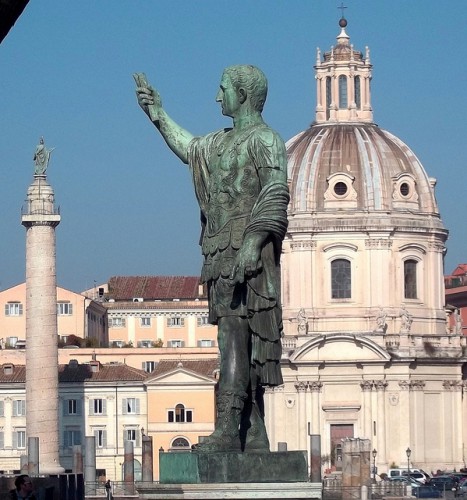 A ce titre, ce concept est à l’image de la culture politique et de la pratique du pouvoir des Empereurs Romains : souple, pragmatique, concrète. Il en va de même de la nature du pouvoir impérial, difficile à appréhender et à définir, puisque construit par empirisme (sa nature monarchique n’est cependant pas contestable). En plus de quatre siècles, le pouvoir impérial a su s’adapter aux situations les plus périlleuses (telle la « crise » du IIIe siècle). Rien de commun en effet entre le principat augustéen, système dans lequel l’empereur est le princeps, le prince, primus inter pares, c’est-à-dire premier entre ses pairs de l’aristocratie sénatoriale ; la tétrarchie de Dioclétien (284-305), partage du pouvoir entre quatre empereurs hiérarchisés et l’empire chrétien de Constantin (306-337), dans lesquels l’empereur est le dominus, le maître.
A ce titre, ce concept est à l’image de la culture politique et de la pratique du pouvoir des Empereurs Romains : souple, pragmatique, concrète. Il en va de même de la nature du pouvoir impérial, difficile à appréhender et à définir, puisque construit par empirisme (sa nature monarchique n’est cependant pas contestable). En plus de quatre siècles, le pouvoir impérial a su s’adapter aux situations les plus périlleuses (telle la « crise » du IIIe siècle). Rien de commun en effet entre le principat augustéen, système dans lequel l’empereur est le princeps, le prince, primus inter pares, c’est-à-dire premier entre ses pairs de l’aristocratie sénatoriale ; la tétrarchie de Dioclétien (284-305), partage du pouvoir entre quatre empereurs hiérarchisés et l’empire chrétien de Constantin (306-337), dans lesquels l’empereur est le dominus, le maître.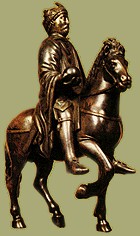 Ainsi, à l’éclatement politique de l’Europe au Moyen Âge et à l’époque Moderne a correspondu un éclatement du pouvoir souverain, de l’imperium. L’idée d’un pouvoir souverain fédérateur n’en n’a pas pour autant été altérée. Il en va de même de l’idée d’une Europe unie, portée par l’Eglise, porteuse première de l’héritage romain. Le regain d’intérêt que connait la notion d’imperium n’est donc pas le fruit d’une passion romantique pour l’antiquité européenne, mais la preuve qu’en rupture avec la conception moderne positiviste de l’histoire, nous regardons les formes d’organisations politiques passées comme autant d’héritages vivants et qu’il nous appartient de nous les réapproprier (les derniers empires héritiers indirects de la vision impériale issue de Rome ont respectivement disparu en 1917 –Empire Russe- et 1918 –Empire Austro-Hongrois et Empire Allemand-). Si ce court panorama historique ne peut prétendre rendre compte de la complexité du phénomène, de sa profondeur, et des nuances nombreuses que comporte l’histoire de l’idée d’imperium ou même de l’idée d’Empire, nous espérons avant tout avoir pu clarifier son origine et son sens afin d’en tirer pour la réflexion le meilleur usage possible. L’imperium est une forme du pouvoir politique souple et forte à la fois, capable de redonner du sens à l’idée de souveraineté, et d’articuler autorité politique continentale et impériale de l’Eurasisme avec les aspirations à la conservation des autonomies et des identités nationales portées par le Nationalisme ou même le Monarchisme. A l’heure où le démocratisme, les droits de l’homme, et le libéralisme entrent dans leur phase de déclin, il nous revient d’opposer une alternative cohérente et fédératrice et à opposer l’imperium au mondialisme.
Ainsi, à l’éclatement politique de l’Europe au Moyen Âge et à l’époque Moderne a correspondu un éclatement du pouvoir souverain, de l’imperium. L’idée d’un pouvoir souverain fédérateur n’en n’a pas pour autant été altérée. Il en va de même de l’idée d’une Europe unie, portée par l’Eglise, porteuse première de l’héritage romain. Le regain d’intérêt que connait la notion d’imperium n’est donc pas le fruit d’une passion romantique pour l’antiquité européenne, mais la preuve qu’en rupture avec la conception moderne positiviste de l’histoire, nous regardons les formes d’organisations politiques passées comme autant d’héritages vivants et qu’il nous appartient de nous les réapproprier (les derniers empires héritiers indirects de la vision impériale issue de Rome ont respectivement disparu en 1917 –Empire Russe- et 1918 –Empire Austro-Hongrois et Empire Allemand-). Si ce court panorama historique ne peut prétendre rendre compte de la complexité du phénomène, de sa profondeur, et des nuances nombreuses que comporte l’histoire de l’idée d’imperium ou même de l’idée d’Empire, nous espérons avant tout avoir pu clarifier son origine et son sens afin d’en tirer pour la réflexion le meilleur usage possible. L’imperium est une forme du pouvoir politique souple et forte à la fois, capable de redonner du sens à l’idée de souveraineté, et d’articuler autorité politique continentale et impériale de l’Eurasisme avec les aspirations à la conservation des autonomies et des identités nationales portées par le Nationalisme ou même le Monarchisme. A l’heure où le démocratisme, les droits de l’homme, et le libéralisme entrent dans leur phase de déclin, il nous revient d’opposer une alternative cohérente et fédératrice et à opposer l’imperium au mondialisme.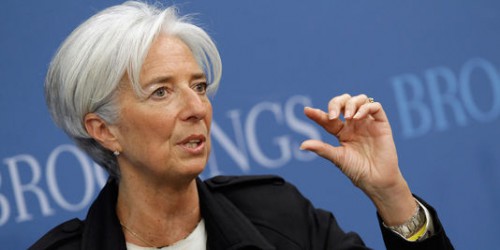
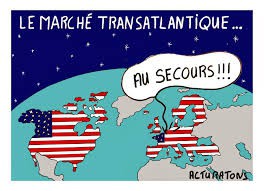 Haciendo gala de la más increíble hipocresía, los gobiernos europeos dicen haber concedido a la Comisión Europea un mandato para negociar con Washington la llamada Asociación Transatlántica dentro del mayor respeto del derecho europeo. En realidad, como ya sucedió anteriormente con el Acuerdo Swift, que pone en manos de las autoridades de Estados Unidos los datos recogidos en Europa sobre los clientes de las compañías aéreas y las transacciones financieras internacionales, se ha orientado a la Comisión Europea implementar la suspensión de las leyes europeas en todo lo tocante a las relaciones con Estados Unidos. Bajo esa perspectiva, la negociación se limita en realidad a determinar los sectores donde los Estados europeos ya no podrán proteger a los ciudadanos de Europa.
Haciendo gala de la más increíble hipocresía, los gobiernos europeos dicen haber concedido a la Comisión Europea un mandato para negociar con Washington la llamada Asociación Transatlántica dentro del mayor respeto del derecho europeo. En realidad, como ya sucedió anteriormente con el Acuerdo Swift, que pone en manos de las autoridades de Estados Unidos los datos recogidos en Europa sobre los clientes de las compañías aéreas y las transacciones financieras internacionales, se ha orientado a la Comisión Europea implementar la suspensión de las leyes europeas en todo lo tocante a las relaciones con Estados Unidos. Bajo esa perspectiva, la negociación se limita en realidad a determinar los sectores donde los Estados europeos ya no podrán proteger a los ciudadanos de Europa.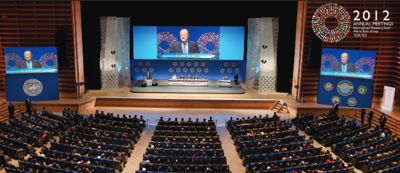

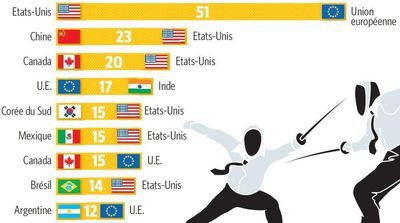
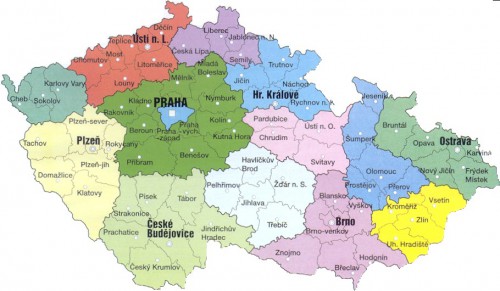

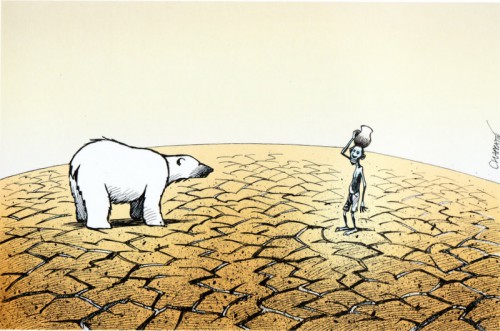
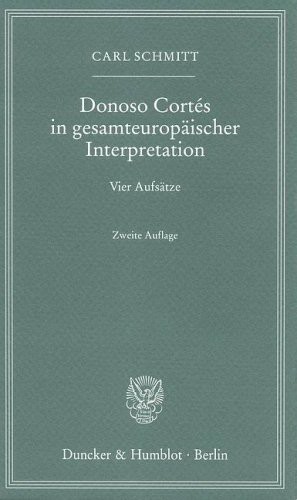 Cuando en Interpretación europea de Donoso Cortés, Carl Schmitt nos describe el pensamiento del político y diplomático español como un pensamiento de carácter “europeo”, nos muestra algo inédito dentro del llamado “pensamiento reaccionario”.
Cuando en Interpretación europea de Donoso Cortés, Carl Schmitt nos describe el pensamiento del político y diplomático español como un pensamiento de carácter “europeo”, nos muestra algo inédito dentro del llamado “pensamiento reaccionario”.

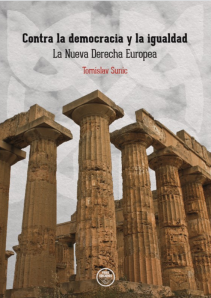
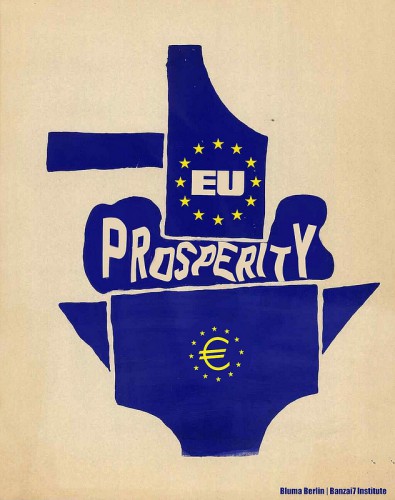
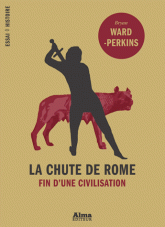 Lisez d’urgence La chute de Rome, fin d’une civilisation, de Bryan Ward-Perkins, traduit de l’anglais chez Alma Éditeur.
Lisez d’urgence La chute de Rome, fin d’une civilisation, de Bryan Ward-Perkins, traduit de l’anglais chez Alma Éditeur.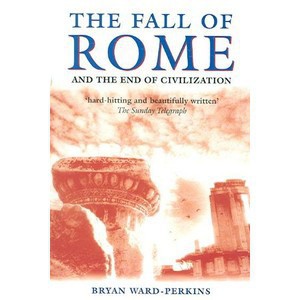 Même Charlemagne, auteur de la ”renaissance carolingienne”, qui voulut succéder aux Empereurs romains en se faisant couronner en 800 dans une Rome en ruine et dépeuplée, et rétablir l’éducation de la jeunesse, était un semi illettré. Le Moyen-Âge (du Ve au XVe siècles, mille ans) fut, pour l’historien et archéologue, un âge de déclin brutal et de très lente renaissance.
Même Charlemagne, auteur de la ”renaissance carolingienne”, qui voulut succéder aux Empereurs romains en se faisant couronner en 800 dans une Rome en ruine et dépeuplée, et rétablir l’éducation de la jeunesse, était un semi illettré. Le Moyen-Âge (du Ve au XVe siècles, mille ans) fut, pour l’historien et archéologue, un âge de déclin brutal et de très lente renaissance.